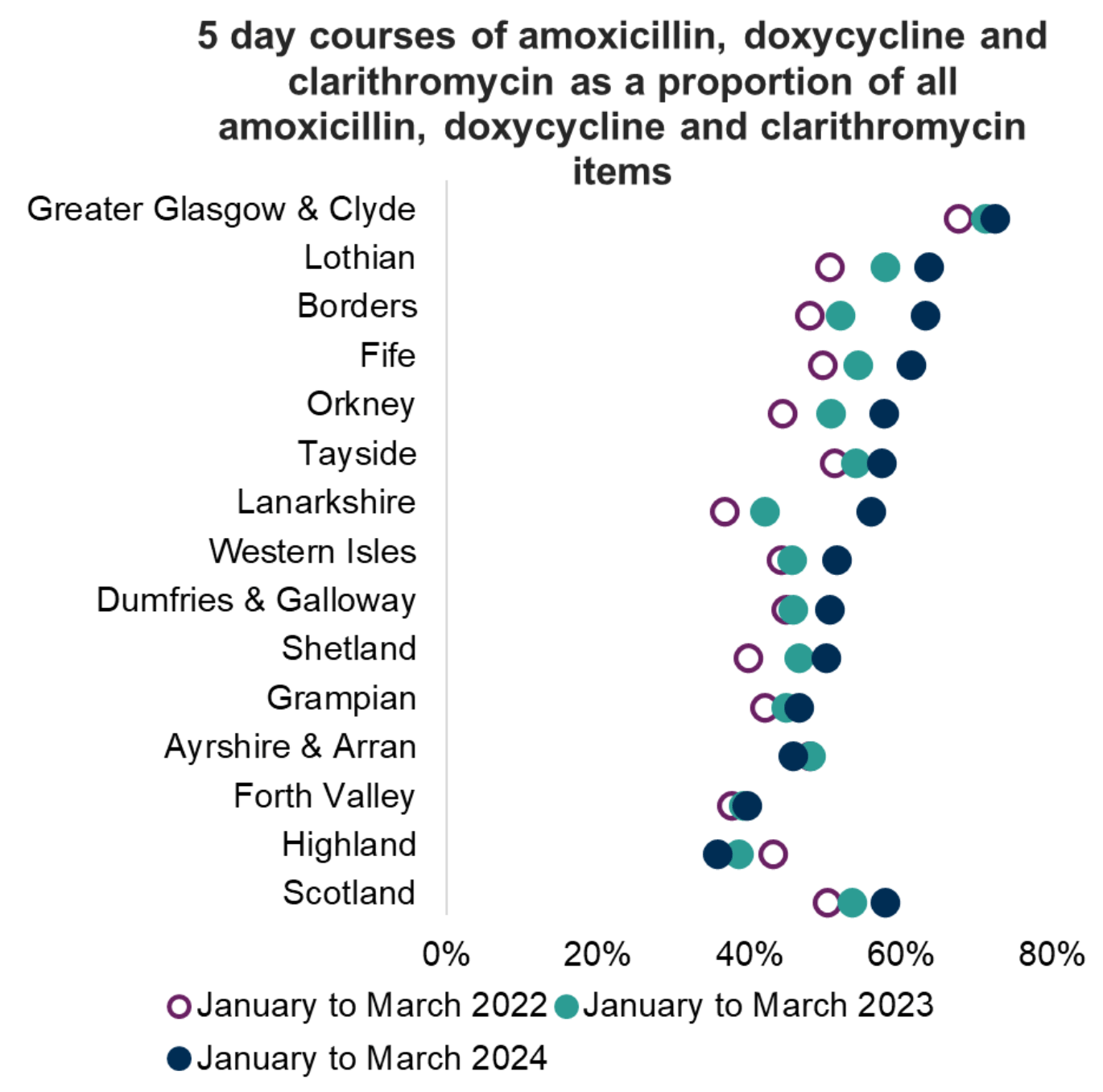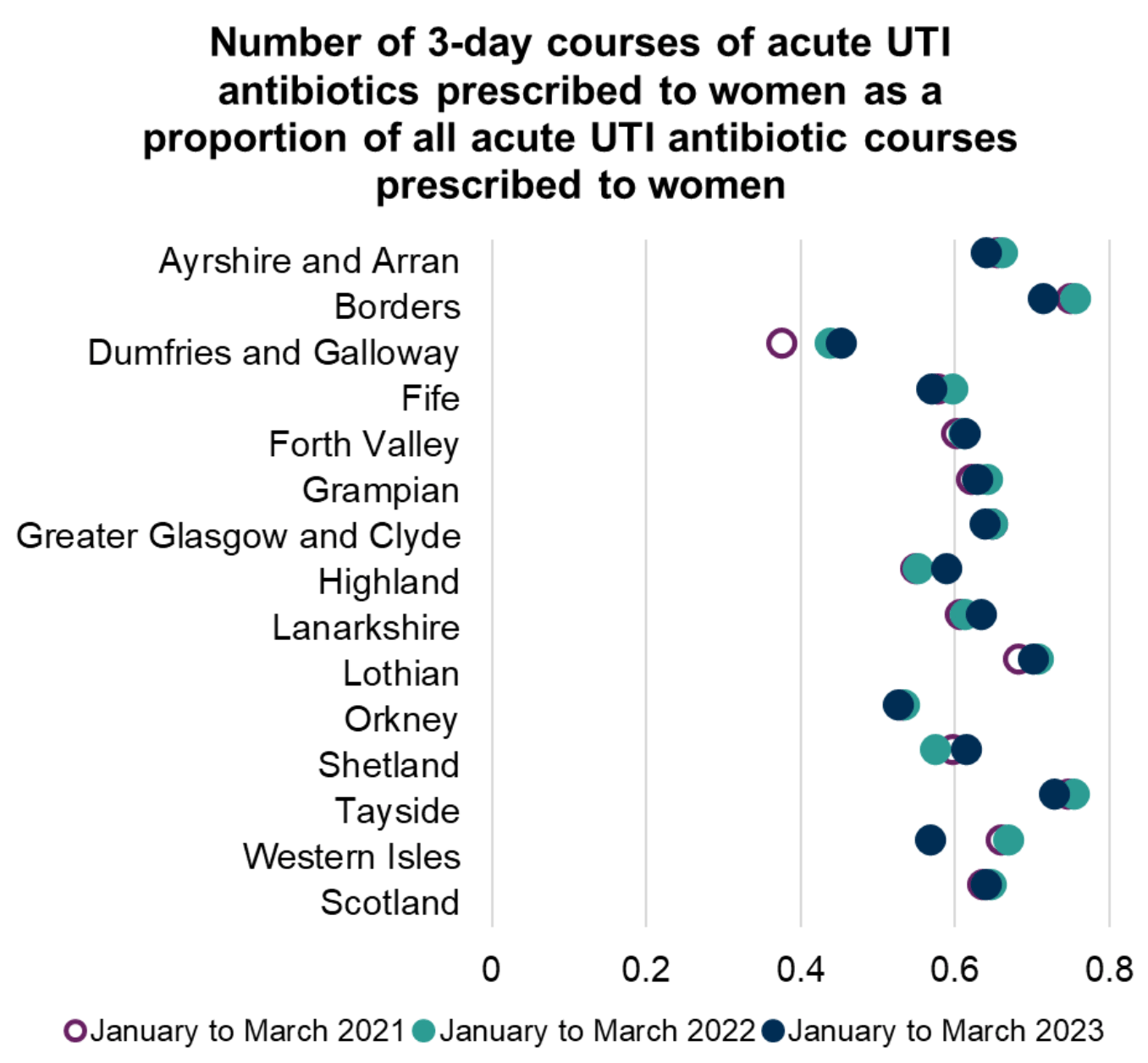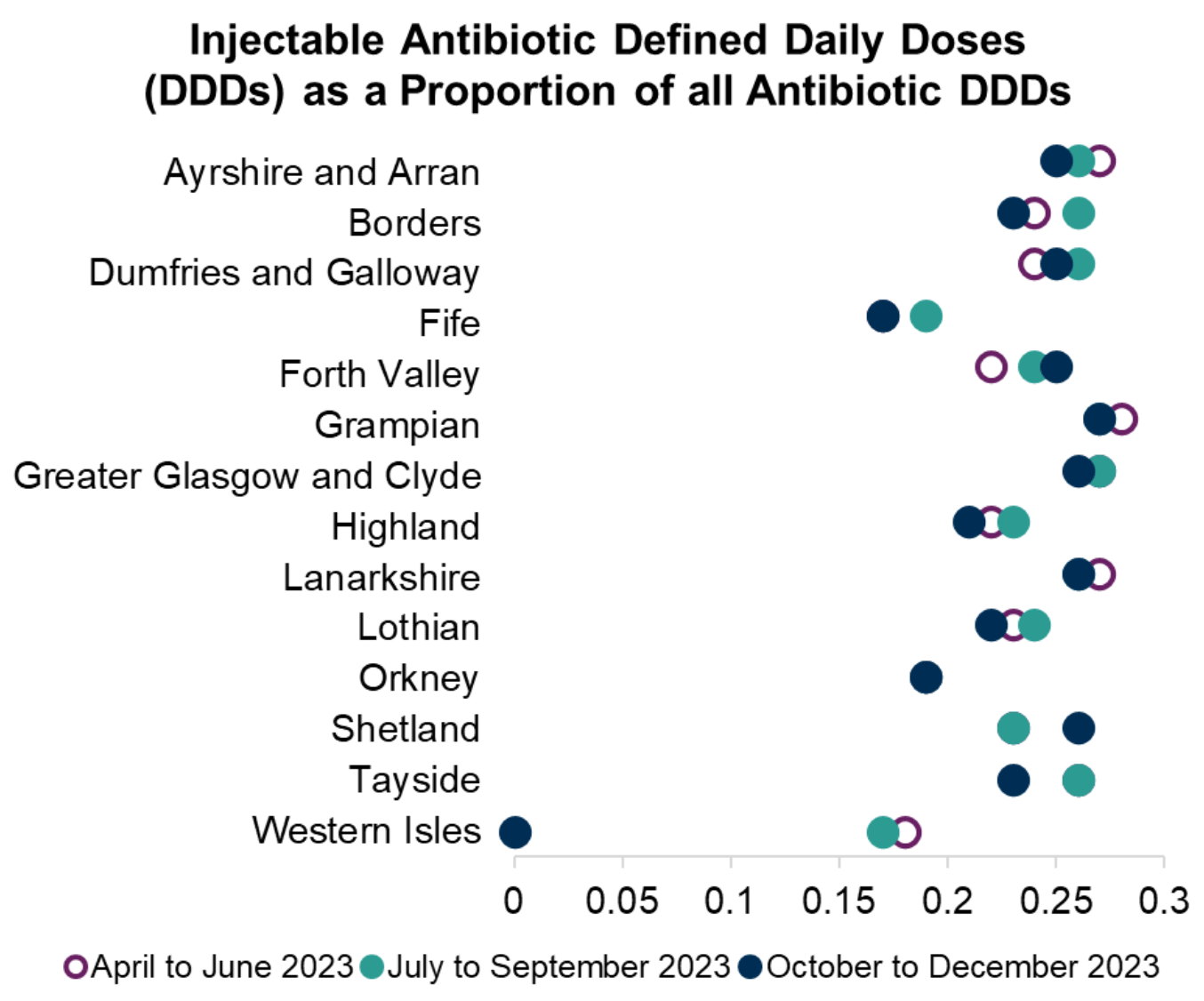Medicines - achieving value and sustainability in prescribing: guidance
Guidance to promote the effective use of medicines and minimise unwarranted variation in prescribing practice across NHS Scotland.
Antimicrobial Stewardship
Antimicrobials and value-based health and care
The aim of this paper is to provide recommendations on the effective prescribing of antimicrobials as part of the national value-based health and care work (VBH&C). The guidance on the use of antimicrobials complements the work of the Scottish Antimicrobial Prescribing Group (SAPG), which promotes the safe and effective use of antibiotics across hospital and community settings to improve antibiotic stewardship and tackle the risks of antimicrobial resistance.
The work of SAPG and the VBH&C group is aligned to Realistic Medicine and the Climate Emergency and Sustainability agenda in Scotland. Appropriate use of antibiotics helps to reduce unwarranted variation in prescribing and maximise value of healthcare, achieving better outcomes for the individual and leading to the creation of a more sustainable health care system.
Background
Antibiotic resistance is a major global public health issue and a threat to the future of healthcare as described in this WHO factsheet.
Residues of medicines, including antibiotics, can be found in water, soil and sludge and can accumulate in living organisms. The ecotoxicological effects have been linked with assisting the spread of antimicrobial resistance and lasting effects on biodiversity.
Choice to prescribe antibiotic treatment
A key antimicrobial stewardship approach to optimising antibiotic use in primary care is minimising their use for symptoms such as coughs, colds, sore throats, and earache in otherwise fit and healthy people. Antibiotics are not effective for viral infections. Self-care and symptom relief should be recommended, for example rest, adequate pain relief and hydration as well as reassurance regarding expected duration of symptoms and actions to take if symptoms worsen or persist. This avoids the risk of increasing exposure to unnecessary antibiotics, adding to issues with antibiotic resistance and avoiding the risk of side effects or medicine interactions.
The top ten antibiotics prescribed in NHS Scotland primary care in 2023 are highlighted below.
| Top 10 Antibiotics prescribed in Primary Care | Total items prescribed for year 2023 |
|---|---|
| Amoxicillin | 1,089,965 |
| Doxycycline | 512,849 |
| Trimethoprim | 437,227 |
| Flucloxacillin | 436,672 |
| Phenoxymethylpenicillin | 385,175 |
| Nitrofurantoin | 310,177 |
| Clarithromycin | 191,008 |
| Metronidazole | 175,393 |
| Co-Amoxiclav | 146,779 |
| Lymecycline | 111,891 |
Duration of antibiotic treatment
Resistance is a natural consequence of using antibiotics, but overuse and inappropriate use can unnecessarily increase the rate of development of resistance.
An important element of antibiotic stewardship is making sure that when antibiotics are clinically indicated, they are not given for any longer than required, and that advice to the patient is to ‘complete the full course’.
Five-day treatment courses for respiratory tract infections
Respiratory infections are the main infection related consultation in NHS Scotland and the most common reason for antibiotics prescribed in the community. Where prescribing is indicated, guidance recommends an initial five-day treatment course for community acquired and hospital acquired pneumonia. In 2022, 64.7% of amoxicillin 500mg courses were for five days duration, compared to 58.1% in 2021. This may suggest improving compliance with antibiotic prescribing policies, however there is room for further optimisation. In Scotland the most common antibiotics prescribed in the treatment of respiratory conditions are amoxicillin, doxycycline and phenoxymethylpenicillin and to a lesser extent clarithromycin and co-amoxiclav which are used in lower volumes. Local antimicrobial guidelines should be followed to identify the most appropriate antibiotic choice and dosing regimen.

Three-day treatment courses for uncomplicated lower urinary tract infections in women.
Trimethoprim and Nitrofurantoin are the most commonly used antibiotics for uncomplicated lower urinary tract infection in NHS Scotland. When antibiotics are indicated the recommended treatment course duration is three days in women.

The National Therapeutic Indicator above shows the prescribing of three-day treatment courses continues to show variation between health boards across NHS Scotland. Reducing exposure to unnecessary antibiotic use or avoiding unnecessary prolonged treatment courses can slow the development of antibiotic resistance.
Antibiotic prescribing and consultation type
There are a variety of types of consultation used in practice including face to face consultations with an increased use of remote consultations, either by telephone, video (NHS Near Me) or e-consultations since the COVID-19 pandemic. Some concern has been raised that some forms of remote consultation (e.g. telephone) may increase the likelihood of an antimicrobial being prescribed in adults.
Use of intravenous antibiotics
In Scotland in 2022 antibiotics given intravenously accounted for around 30% of total antibiotic use in acute hospitals. The work on clinical review led by SAPG has focussed on patients started on IV antibiotics and aims for a documented management plan including rationalisation within 72 hours of starting treatment. This aims to reduce unnecessary continuation of antibiotics, ensure personalised treatment and ensure appropriate IV to oral switch. This brings associated benefits for patients of reduced risk of device-related infections and potential for earlier discharge from hospital. Use of oral antibiotics also reduces the use of plastics, e.g. giving sets, when compared to IV antibiotics. Switching to oral antibiotics also releases nursing capacity for other care related tasks.
The National therapeutic indicator below shows injectable antibiotics as a proportion of all antibiotics prescribed in secondary care by NHS board across NHS Scotland.

Use of solid oral dosage forms of antibiotics
Solid oral dosage forms are often safer (licensed), more cost effective and more acceptable to patients and carers. Tablet distribution is simpler, often they have a longer shelf life and create less packaging waste. Pill swallowing is a skill that can be taught to children above the age of four and adults if needed. Life cycle assessments (LCA) of various dosage forms of medications illustrate that solid oral dosage forms can also have a reduced climate change impact compared to liquids.
Safe disposal of pharmaceuticals
Reducing medicine waste can be done through reducing the inappropriate use of antibiotics, ensuring the optimum treatment course is prescribed and that any unused medicines, including antibiotics, should be returned to the community pharmacy for safe disposal by incineration. No medication should be flushed down the toilet or sink, or put into domestic bins and there are national posters (produced by Scottish Water’s Nature Calls campaign and Scottish Government’s Antibiotic Amnesty) which encourage safe disposal of any medicines prescribed.
Recommendations
- Avoid prescriptions for antibiotics in self-limiting or viral infections to reduce the risk of antibiotic resistance. Promote self-management for these situations: e.g., rest, symptomatic relief and hydration. Encourage people to become antibiotic guardians. The RCGP Target Toolkit offers resources to aid during consultations to ensure appropriate prescribing.
- Ensure that antibiotic courses are prescribed for the appropriate duration. (e.g., three days for uncomplicated UTI’s in women and five days for community acquired and hospital acquired pneumonia). Some prescribing systems can be adjusted to default course lengths.
- Reinforce advice that antibiotics are taken as directed to ensure effectiveness (Take at regular intervals, do not skip doses and check that the full course is taken). Advise that patients do not save antibiotics for later or share unused antibiotics with family or friends.
- Ensure a management plan is documented within 72 hours when commencing IV antibiotics, including consideration of continuation and rationalisation of treatment with the potential for stopping, or switching IV to oral therapy.
- Prescribe oral solid dosage forms where possible, minimising use of liquid preparations or IV to where they are necessary and appropriate.
- Offer resources and advice to patients and families on learning how to swallow pills.
- Encourage that any unused medicine is returned to community pharmacy for safe disposal.
- Signpost and encourage healthcare staff to update education in antibiotic management using education materials via local board Antimicrobial Management Teams and SAPG and NES materials on TURAS.
Contact
Email: EPandT@gov.scot
There is a problem
Thanks for your feedback